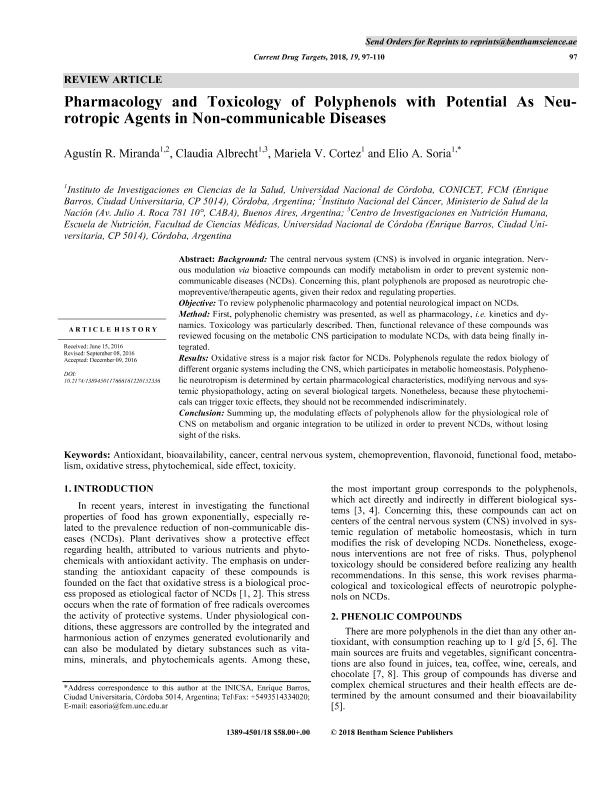Artículo
Pharmacology and toxicology of polyphenols with potential as neurotropic agents in non-communicable diseases
Fecha de publicación:
03/2018
Editorial:
Bentham Science Publishers
Revista:
Current Drug Targets
ISSN:
1389-4501
Idioma:
Inglés
Tipo de recurso:
Artículo publicado
Clasificación temática:
Resumen
The central nervous system (CNS) is involved in organic integration. Nervousmodulation via bioactive compounds can modify metabolism in order to prevent systemic noncommunicablediseases (NCDs). Concerning this, plant polyphenols are proposed as neurotropic chemopreventive/therapeutic agents, given their redox and regulating properties. To review polyphenolic pharmacology and potential neurological impact on NCDs. First, polyphenolic chemistry was presented, as well as pharmacology, i.e. kinetics and dynamics.Toxicology was particularly described. Then, functional relevance of these compounds was reviewed focusing on the metabolic CNS participation to modulate NCDs, with data being finally integrated. Oxidative stress is a major risk factor for NCDs. Polyphenols regulate the redox biology of different organic systems including the CNS, which participates in metabolic homeostasis. Polyphenolic neurotropism is determined by certain pharmacological characteristics, modifying nervous and systemic physiopathology, acting on several biological targets. Nonetheless, because these phytochemicals can trigger toxic effects, they should not be recommended indiscriminately.Conclusion: Summing up, the modulating effects of polyphenols allow for the physiological role of CNS on metabolism and organic integration to be utilized in order to prevent NCDs, without losing sight of the risks.
Archivos asociados
Licencia
Identificadores
Colecciones
Articulos(INICSA)
Articulos de INSTITUTO DE INVESTIGACIONES EN CIENCIAS DE LA SALUD
Articulos de INSTITUTO DE INVESTIGACIONES EN CIENCIAS DE LA SALUD
Citación
Miranda, Agustín Ramiro; Albrecht, Claudia; Cortez, Mariela Valentina; Soria, Elio Andres; Pharmacology and toxicology of polyphenols with potential as neurotropic agents in non-communicable diseases; Bentham Science Publishers; Current Drug Targets; 19; 2; 3-2018; 97-110
Compartir
Altmétricas




